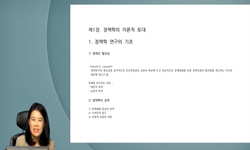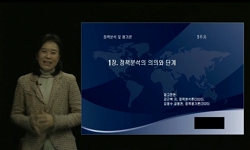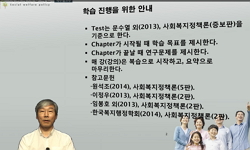A study on the process of establishing Corruption Investigation Office For High-ranking Officials -Based on Kingdon’s Policy Stream Model Hwang Hae Hun Public Adminstration The Graduate School Seoul National University The Act on the Establishment a...
http://chineseinput.net/에서 pinyin(병음)방식으로 중국어를 변환할 수 있습니다.
변환된 중국어를 복사하여 사용하시면 됩니다.
- 中文 을 입력하시려면 zhongwen을 입력하시고 space를누르시면됩니다.
- 北京 을 입력하시려면 beijing을 입력하시고 space를 누르시면 됩니다.
고위공직자범죄수사처 설립 과정에 관한 연구 : Kingdon의 정책흐름모형을 중심으로 = A study on the process of establishing Corruption Investigation Office For High-ranking Officials: Based on Kingdon’s Policy Stream Model
한글로보기https://www.riss.kr/link?id=T17000065
- 저자
-
발행사항
서울 : 서울대학교 대학원, 2024
-
학위논문사항
학위논문(석사) -- 서울대학교 대학원 , 행정학과(행정학전공) , 2024. 2
-
발행연도
2024
-
작성언어
한국어
-
주제어
고위공직자범죄수사처 ; 정책흐름모형 ; 정책결정 ; 정책선도자
-
DDC
350
-
발행국(도시)
서울
-
형태사항
viii, 145 ; 26 cm
-
일반주기명
지도교수: 이진수
-
UCI식별코드
I804:11032-000000181846
- DOI식별코드
- 소장기관
-
0
상세조회 -
0
다운로드
부가정보
다국어 초록 (Multilingual Abstract)
Officials
-Based on Kingdon’s Policy Stream Model
Hwang Hae Hun
Public Adminstration
The Graduate School
Seoul National University
The Act on the Establishment and Operation of Corruption Investigation Office For High-ranking Officials was passed by the National Assembly on December 30, 2019. The establishment of the Corruption Investigation Office For High-ranking Officials has been a long-cherished wish of progressive political parties and civic groups since the Kim Dae-jung administration. It was designated as a fast-track agenda item in April 2019, and in December of the same year, the bill was passed despite extreme opposition from the conservative opposition party and the prosecution's vested interests.
The purpose of this study is to examine and understand the policy-making process that led to the establishment of the Corruption Investigation Office For High-ranking Officials by overcoming various difficulties over a long period of time and finally passing the law in December 2019. The scope and target of the study will be discussions on the establishment of Corruption Investigation Office For High-ranking Officials from the Kim Dae-jung administration to the Moon Jae-in administration in 1998. Kingdon's policy stream model is used as an analysis framework to analyze the discussions and decisions leading up to the establishment of the Corruption Investigation Office For High-ranking Officials through the enactment of the law.
The reason for applying Kingdon's policy stream model as an analysis framework is that the enactment of Corruption Investigation Office For High-ranking Officials law and the installation of related-system did not maintain a consistent tone for establishing corruption investigation Office for high-ranking officials. And this policy was not prepared after deliberation without conflicting opinions of policy participants. Kingdon's policy stream model was established based on the trash can model, and appears to be suitable for explaining the establishment process of the Corruption Investigation Office for high-ranking officials, which achieved results amid regime changes and conflicts of political interests. In addition, the general characteristics of Korea's policy-making process were also considered. In other words, this model is more appropriate to explain the policy-making process in Korea, where policy entrepreneur, such as the president with a single five-year term (without two four-year terms), and the prime minister and ministers who are frequently replaced, focus on short-term policy goals and have difficulty in considering long-term policies.
Through this study, the stream of problems, the stream of policy alternatives, and the policy window in the policy-making process were identified, and the policy-making process was examined by government period to see how these combined to open the policy window and produce the resulting policy. At this time, we wanted to identify who the important policy leaders were, what role they played, and what influence they had.
From the inauguration of the Kim Dae-jung administration in 1998 to before the inauguration of the Moon Jae-in administration in 2017, the policy window failed to open because the stream of each necessary element did not go smoothly. In the Moon Jae-in administration, the stream of each element was coupled, opening a policy window for the Corruption Investigation Office For High-ranking Officials Act in the 20th National Assembly. With the support of the President as a policy entrepreneur and the active role of the National Assembly members who proposed the bill, the bill was eventually adopted in 2019.
In addition, this study sought to examine how the factors necessary to open the policy window influenced the next government. In other words, It was examined whether each of the elements necessary to open the policy window - problem stream, policy stream, political stream, and the role of policy entrepreneurs - acted as opportunities or constraints for the next government's policy window to open.
In conclusion, the research results confirmed that the three independent streams were coupled to open a policy window and produce policy output, which was consistent with Kingdon's policy stream model. The political stream that Kingdon considered was the most decisive factor here. It was found that the President and the National Assembly members involved in proposing the bill were policy entrepreneurs and played a leading and active role in ensuring that the policy was introduced throughout the entire policy decision-making process.
This study can have political implications as follows. firstly, in order for going off well in the policy process, the social discussion process, such as discussion and communication between policy participants, and the role of the policy entrepreneurs who will lead it are very important. Because it is difficult to succeed through the government's unilateral implementation alone. In addition, there are still many opposing opinions on the establishment of the Corruption Investigation Office For High-ranking Officials, so continued interest, policy evaluation, and follow-up research on system supplementation are needed in the future. Through this, it will be possible to provide implications for policies or systems that the government plans to introduce in the future.
Keywords : Corruption Investigation Office For High-ranking Officials, Policy Stream Model, Policy Making, Policy Entrepreneur.
Student Number : 2021-2339
A study on the process of establishing Corruption Investigation Office For High-ranking
Officials
-Based on Kingdon’s Policy Stream Model
Hwang Hae Hun
Public Adminstration
The Graduate School
Seoul National University
The Act on the Establishment and Operation of Corruption Investigation Office For High-ranking Officials was passed by the National Assembly on December 30, 2019. The establishment of the Corruption Investigation Office For High-ranking Officials has been a long-cherished wish of progressive political parties and civic groups since the Kim Dae-jung administration. It was designated as a fast-track agenda item in April 2019, and in December of the same year, the bill was passed despite extreme opposition from the conservative opposition party and the prosecution's vested interests.
The purpose of this study is to examine and understand the policy-making process that led to the establishment of the Corruption Investigation Office For High-ranking Officials by overcoming various difficulties over a long period of time and finally passing the law in December 2019. The scope and target of the study will be discussions on the establishment of Corruption Investigation Office For High-ranking Officials from the Kim Dae-jung administration to the Moon Jae-in administration in 1998. Kingdon's policy stream model is used as an analysis framework to analyze the discussions and decisions leading up to the establishment of the Corruption Investigation Office For High-ranking Officials through the enactment of the law.
The reason for applying Kingdon's policy stream model as an analysis framework is that the enactment of Corruption Investigation Office For High-ranking Officials law and the installation of related-system did not maintain a consistent tone for establishing corruption investigation Office for high-ranking officials. And this policy was not prepared after deliberation without conflicting opinions of policy participants. Kingdon's policy stream model was established based on the trash can model, and appears to be suitable for explaining the establishment process of the Corruption Investigation Office for high-ranking officials, which achieved results amid regime changes and conflicts of political interests. In addition, the general characteristics of Korea's policy-making process were also considered. In other words, this model is more appropriate to explain the policy-making process in Korea, where policy entrepreneur, such as the president with a single five-year term (without two four-year terms), and the prime minister and ministers who are frequently replaced, focus on short-term policy goals and have difficulty in considering long-term policies.
Through this study, the stream of problems, the stream of policy alternatives, and the policy window in the policy-making process were identified, and the policy-making process was examined by government period to see how these combined to open the policy window and produce the resulting policy. At this time, we wanted to identify who the important policy leaders were, what role they played, and what influence they had.
From the inauguration of the Kim Dae-jung administration in 1998 to before the inauguration of the Moon Jae-in administration in 2017, the policy window failed to open because the stream of each necessary element did not go smoothly. In the Moon Jae-in administration, the stream of each element was coupled, opening a policy window for the Corruption Investigation Office For High-ranking Officials Act in the 20th National Assembly. With the support of the President as a policy entrepreneur and the active role of the National Assembly members who proposed the bill, the bill was eventually adopted in 2019.
In addition, this study sought to examine how the factors necessary to open the policy window influenced the next government. In other words, It was examined whether each of the elements necessary to open the policy window - problem stream, policy stream, political stream, and the role of policy entrepreneurs - acted as opportunities or constraints for the next government's policy window to open.
In conclusion, the research results confirmed that the three independent streams were coupled to open a policy window and produce policy output, which was consistent with Kingdon's policy stream model. The political stream that Kingdon considered was the most decisive factor here. It was found that the President and the National Assembly members involved in proposing the bill were policy entrepreneurs and played a leading and active role in ensuring that the policy was introduced throughout the entire policy decision-making process.
This study can have political implications as follows. firstly, in order for going off well in the policy process, the social discussion process, such as discussion and communication between policy participants, and the role of the policy entrepreneurs who will lead it are very important. Because it is difficult to succeed through the government's unilateral implementation alone. In addition, there are still many opposing opinions on the establishment of the Corruption Investigation Office For High-ranking Officials, so continued interest, policy evaluation, and follow-up research on system supplementation are needed in the future. Through this, it will be possible to provide implications for policies or systems that the government plans to introduce in the future.
Keywords : Corruption Investigation Office For High-ranking Officials, Policy Stream Model, Policy Making, Policy Entrepreneur.
Student Number : 2021-2339
국문 초록 (Abstract)
고위공직자범죄수사처 설립 및 운영에 관한 법률이 2019년 12월 30일 국회를 통과하였다. 공수처의 설립은 김대중 정부 이후 진보적 인 성격의 정당이나 시민단체의 숙원이었다. 2019년 4월 신...
고위공직자범죄수사처 설립 및 운영에 관한 법률이 2019년 12월 30일 국회를 통과하였다. 공수처의 설립은 김대중 정부 이후 진보적 인 성격의 정당이나 시민단체의 숙원이었다. 2019년 4월 신속처리안 건으로 지정되고, 같은 해 12월, 보수적인 성격의 야당과 검찰 기득 권 세력의 극심한 반대에도 불구하고, 법안이 통과되는 성과를 보게 된 것이다. 본 연구는 오랜 기간 여러 어려움을 극복하고, 마침내 2019년 12 월 법률 통과로 공수처가 설립되기까지의 정책 결정 과정을 살펴보 고 이해하는 것을 목적으로 한다. 연구 범위 및 대상은 1998년 김대 중 정부 때부터 문재인 정부까지의 고위공직자범죄수사처 설립을 위한 논의가 되겠다. 법률의 제정으로 공수처가 설립되기까지의 논 의와 의사결정에 관한 분석을 위해서는 킹돈(Kingdon)의 정책흐름 모형을 분석틀로 이용하고 있다. Kingdon의 정책흐름모형을 분석틀로 적용하게 된 이유는 공수처 관련법의 제정과 그 설치가 일관된 기조를 유지하며, 정책참여자들 의 의견 충돌 없이 숙고 끝에 마련된 정책이 아님에 있다. Kingdon 의 정책흐름모형은 쓰레기통모형을 바탕으로 해서 정립된 것으로, 정권교체와 정치적 이해관계의 충돌 속에서 성과를 보게 된 공수처 의 설립 과정을 설명하는 데 적합한 것으로 보인다. 아울러 우리나 라의 정책결정 과정의 일반적인 특징도 고려하였다. 즉, 중임제가 아닌 5년 단임제의 대통령, 자주 교체되는 국무총리와 장관 등 정책 선도자들은 단기적인 정책목표에 주력하고 장기적인 정책에 대한 고려가 어려운 우리나라의 정책결정 과정을 설명하기에 이 모형이 더 적실성이 있다고 판단하였다. 이 연구를 통해 정책결정과정에서의 문제의 흐름, 정책대안의 흐 름, 정치의 흐름을 각각 살펴보고, 이들이 어떻게 결합하는지 파악 함으로써, 정책의 창이 열리게 되고 정책 결과물이 산출되었는지 정 책 결정의 과정을 정부 시기별로 검토해 보았다. 이때 중요한 정책 선도자는 누구이며, 어떤 역할을 수행하고 영향을 미쳤는지 확인하 고자 하였다. 1998년 김대중 정부 출범 이후부터 2017년 문재인 정부 출범 이전 까지는 정책의 창이 열리는 필요한 각 요소의 흐름이 원활하지 못 하여 정책의 창이 열리는 데 실패하였다. 그러다가 문재인 정부에 들어와서 각 요소의 흐름들이 결합하여 정책의 창이 열리게 되었고, 정책선도자로서 대통령의 지지와 법안을 발의한 국회의원 등의 적 극적인 활동으로 결국 2019년 공수처법이 국회 본회의를 통과하게 되었다. 아울러 본 연구에서는 정책의 창이 열리는 데 필요한 요소들이 다 음 정부에 어떤 요인으로 작용하였는지도 검토하고자 하였다. 즉 정 책의 창이 열리는 데 필요한 각각의 요소들인 문제의 흐름, 정책대 안의 흐름, 정치의 흐름과 정책선도자의 역할이 다음 정부의 정책의 창이 열리는 데 기회요인이나 제약요인으로 작용하였는지 살펴보았 다. 결론적으로, 독립적인 세 개의 흐름이 잘 결합하여 정책의 창이 열리고 법률 제정의 정책 산출이 이루어짐으로써, Kingdon의 정책 흐름모형을 통해 설명이 가능하다는 점을 확인하였다. Kingdon이 중요시한 정치의 흐름이 공수처법 제정에 있어서도 가장 중요하게 영향을 미친 요인으로 작용하였으며, 대통령과 국회의원이 정책선도 자로서 전체 정책결정과정에서 정책 도입이 잘 이루어질 수 있도록 국회 내부의 협상이나 여론을 이끌어나가는 적극적인 역할을 수행 하였음을 알 수 있었다. 마지막으로, 연구를 통하여 다음과 같은 정책적 함의를 제시하였 다. 정책과정이 잘 진행되기 위해서는 정부의 일방적인 추진만으로 는 성공하기 어렵고, 정책참여자들의 토론과 의사소통 등 사회적 논 의 과정과 이를 주도할 정책선도자의 역할이 매우 중요하다. 또한 공수처 설립에 대한 반대의견도 여전히 많이 존재하므로 향후 지속 적인 관심과 정책의 평가 및 제도 보완에 대한 후속 연구가 필요하 다. 이를 통해 앞으로 정부에서 도입하려고 하는 정책이나 제도에 대한 시사점을 제공할 수 있을 것이다. 주요어 : 고위공직자범죄수사처, 정책흐름모형, 정책결정, 정책선도자 학 번 : 2021-23399
목차 (Table of Contents)
- 제 1 장 서론 1
- 제 1 절 연구의 배경 1
- 제 2 절 연구의 목적 2
- 제 2 장 이론적 배경 4
- 제 1 절 공직자비리 수사기구 4
- 제 1 장 서론 1
- 제 1 절 연구의 배경 1
- 제 2 절 연구의 목적 2
- 제 2 장 이론적 배경 4
- 제 1 절 공직자비리 수사기구 4
- 1. 공직자비리 수사기구의 유형 및 사례 4
- 2. 공수처 관련 선행연구 검토 8
- 3. 공수처 설립 배경 및 의의 12
- 4. 공수처 조직과 권한 14
- 제 2 절 정책결정모형 18
- 1. 정책결정모형의 종류 18
- 2. Kingdon의 정책흐름모형 21
- 제 3 장 연구의 방법 31
- 제 1 절 연구 대상 31
- 제 2 절 연구 문제 31
- 제 3 절 연구 방법 32
- 제 4 절 연구의 분석틀 35
- 제 4 장 정책결정과정 분석 36
- 제 1 절 김대중 정부 36
- 1. 문제의 흐름 36
- 2. 정책대안의 흐름 38
- 3. 정치의 흐름 39
- 4. 정책선도자 46
- 5. 정책의 창 47
- 6. 소결 50
- 제 2 절 노무현 정부 51
- 1. 문제의 흐름 51
- 2. 정책대안의 흐름 51
- 3. 정치의 흐름 53
- 4. 정책선도자 64
- 5. 정책의 창 65
- 6. 소결 68
- 제 3 절 이명박 정부 69
- 1. 문제의 흐름 69
- 2. 정책대안의 흐름 70
- 3. 정치의 흐름 75
- 4. 정책선도자 89
- 5. 정책의 창 89
- 6. 소결 91
- 제 4 절 박근혜 정부 93
- 1. 문제의 흐름 93
- 2. 정책대안의 흐름 94
- 3. 정치의 흐름 96
- 4. 정책선도자 101
- 5. 정책의 창 102
- 6. 소결 104
- 제 5 절 문재인 정부 106
- 1. 문제의 흐름 106
- 2. 정책대안의 흐름 108
- 3. 정치의 흐름 115
- 4. 정책선도자 122
- 5. 정책의 창 128
- 6. 소결 129
- 제 5 장 결론 131
- 제 1 절 연구의 요약 131
- 제 2 절 연구의 함의 132
- 제 3 절 연구의 한계 및 보완 134
- 참고문헌 135
- Abstract 141












